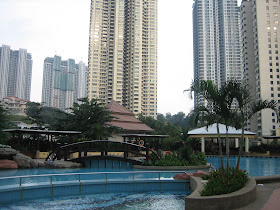My first weeks here in Malaysia, my thoughts often turned to the criticisms made about immigrants to the U.S. Some of the remarks of African American Muslims whom I interviewed for my book were quite intense like this one: “Immigrants have come here and have reaped the benefits to the point that it has killed their Islam. You come here for materialism, but you forget that you are Muslim, and you forget your responsibility to establish Allah’s din [Islam]. The immigrants should be putting forth more of an effort to utilize their resources towards the upliftment of the African American community.”
The African American community should be a priority because, according to this African American imam, “the most prominent spots to establish Allah’s din are those places where injustices and poverty exist.”
The African American community should be a priority because, according to this African American imam, “the most prominent spots to establish Allah’s din are those places where injustices and poverty exist.”
 |
| Our Condo Pool |
I could never afford to live in an affluent neighborhood back home like the one I lived in here in KL, but the cost of living is cheaper here, and if you have a US salary or US savings, you can live among the rich. Given my fears of the things that come with low quality housing and the fear of the unknown about Malaysian living, I jumped at the chance to live in Mont Kiara, an expat area.
 |
| Chinese New Year |
8. Paying very little for health care. Without insurance, seeing a doctor only costs $6. And when it turned out that nothing was really wrong, they often let me go without a charge.
The down side to this is that doctors prescribe way too many drugs here. However, I’ve never been one to follow the doctor’s orders.
7. Muslims and non-Muslims share purity rituals: Everyone takes their shoes off when entering a home and bathrooms come with water hoses.
7. Muslims and non-Muslims share purity rituals: Everyone takes their shoes off when entering a home and bathrooms come with water hoses.
6. The lush landscape: the gardens, palm trees, fruits and flowers hanging low. Oooh, sounds like Paradise.
 |
| This photo was actually taken in Thailand, but I saw my first mango tree ever in Malaysia. |
I came across other neat Australian products like goat-based infant formula, something I never found in the US but could be quite useful for babies allergic to cow's milk.
4. Prayer rooms at the mall and everywhere. Also, wudu stations in these prayer areas.
No worrying about what people think when they see me washing my feet in a public bathroom. No praying in fitting rooms or other obscure places out of public view.
No worrying about what people think when they see me washing my feet in a public bathroom. No praying in fitting rooms or other obscure places out of public view.
 |
| Dragon Fruit |
2. Halal meat everywhere!
1. Befriending people from all over the world.
In high school, I memorized Margaret Walker’s poem "For My People," and recited it before public audiences. I love this poem. I occasionally recite it to my children with the same conviction and heart that I did almost twenty years ago.
1. Befriending people from all over the world.
In high school, I memorized Margaret Walker’s poem "For My People," and recited it before public audiences. I love this poem. I occasionally recite it to my children with the same conviction and heart that I did almost twenty years ago.
Raising two African American boys in Atlanta, GA, I will continue to have a special regard for and sense of accountability to the struggles of black people in America but now I truly understand what it means to say that all of humanity are my people.
Yahya’s Malaysian "grandmother" is a sweet, generous Chinese woman who brought Yahya special treats. I had no association with Chinese and Japanese in the US. Islam does not ordinarily connect me with them as it links me to Indians and other Asians with large Muslim populations in the U.S.
In KL, however, they were my neighbors, the ones who smiled and greeted me and my boys on the elevator, at the playground and community center, at the food truck, and on the shuttle to the shopping plaza. They are now among my dearest friends.
I am forever grateful and truly transformed by my Malaysia experience. I now look forward to the next chapter.

